JICA President Shinichi Kitaoka visited Zambia and Malawi on Aug. 23-27, met with top officials of each country and visited the sites of ODA projects.
The first country, Zambia, is known as a democratic country with a politically stability. While Zambia is blessed with mineral resources such as copper and cobalt, the promotion of other export industries is overdue, and changing an economic structure dependent on the mining industry is an important issue.
On Aug. 23, in the capital of Lusaka, Mr. Kitaoka visited Chilenje Level 1 Hospital, which was built with Japanese grant aid completed in July 2016. Mr. Kitaoka saw that the hospital is playing a significant role in improving residents' access to medical services. Mr. Kitaoka also visited a factory of Kansai Plascon, the local subsidiary of Kansai Paint Co., Ltd. At Kansai Paint, he found that the distribution of anti-infectious-disease paint by the Verification Survey with the Private Sector for Disseminating Japanese Technologies is expected to help prevent malaria and other communicable diseases and that it has the potential to change the lives of local people.
On the same day, Mr. Kitaoka met with Minister of Finance Margaret Mwanakatwe. Mr. Kitaoka said JICA would support Zambia's efforts to escape its dependence on natural resources and diversify its industry, including agriculture. JICA will also assist Zambia in its work to focus on enriching social services such as health care and education, he added. Ms. Mwanakatwe explained macroeconomic trends and debt management, and said she looks forward to continued assistance from JICA.
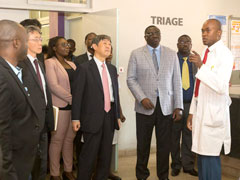
Visit to Chilenje Level 1 Hospital (emergency outpatient). From right are the acting hospital head, a vice-minister of Health and JICA President Shinichi Kitaoka.
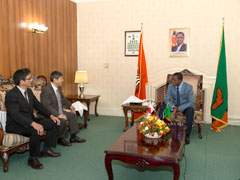
Meeting with the president of Zambia. From right are President Edgar Lungu, JICA President Shinichi Kitaoka and JICA Zambia Office Chief Representative Junichi Hanai.
On the next day, Aug. 24, Mr. Kitaoka met with President Edgar Lungu. Mr. Kitaoka expressed his respect for Zambia's long-term political stability and introduced JICA's development cooperation approach, which is characterized by an emphasis on human security and dialogue on an equal footing. Finally, he said JICA would like to keep cooperating in health care, education and agriculture sectors. Mr. Lungu thanked JICA for its assistance and said he looks forward to JICA's support for the further development of Zambia.
Next, Mr. Kitaoka visited the National Science Center (NSC) under the Ministry of Education, as well as the University of Zambia's School of Veterinary Medicine (UNZA-SVM), to which Japan has been providing cooperation continuously since the 1980s. The NSC is the center for mathematics and science education for the entire Africa region, and the UNZA-SVM plays the role of a base for research on measures to fight zoonoses, diseases that can be transmitted between animals and people such as Ebola in the southern Africa area. Mr. Kitaoka confirmed that there are positive effects in the region and that it is essential to develop both institutions further.
Subsequently, Mr. Kitaoka went to Malawi a first visit made by JICA president. Malawi is one of the least developed countries in the world, with a per capita gross national income of US$320. JICA is cooperating with the government of Malawi on its initiatives so that no one will be left behind in development and the country will continue to enjoy peace and stable growth.
On Aug. 26, Mr. Kitaoka visited a Japan Overseas Cooperation Volunteers’ (JOCVs) dormitory in Lilongwe, the capital, and placed flowers at the monument. JICA has sent a total of 1,853 JOCVs to Malawi since 1971, the highest number of any country in the world, and 12 have lost their lives during their tenures. The JICA Malawi Office continues to hold memorial events. Mr. Kitaoka reconfirmed the utmost importance of developing projects with the safety of stakeholders foremost in mind in Malawi, which has a poor transportation and medical care situation.
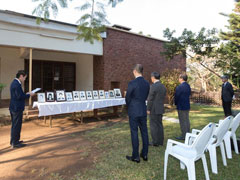
JICA President Shinichi Kitaoka places flowers at a memorial to deceased JOCVs.
Mr. Kitaoka met with Goodall Edward Gondwe, the minister of Finance, Economic Planning and Development, on Aug. 27. During the meeting, Mr. Kitaoka touched on the history and results of Japan's cooperation, which began with the dispatching of JOCVs in 1971, and said that returned JOCVs maintaining their ties with Malawi is the basis for building friendship and trust between the two countries. Mr. Kitaoka and Mr. Gondwe discussed cooperation to improve on the national 10 percent electrification rate and electricity shortages, and in the field of agriculture, they talked about the importance of irrigation development.
Mr. Kitaoka also had an informal talk with Bright Msaka, the minister of Education, Science and Technology, and Malawian government officials who had studied in Japan. Mr. Kitaoka and Mr. Msaka agreed that to improve the quality of education, it is important to train local teachers and strengthen their abilities.
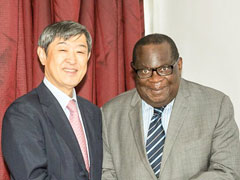
A meeting with Malawi's minister of Finance, Economic Planning and Development. From right are Minister Goodall Edward Gondwe and JICA President Shinichi Kitaoka.
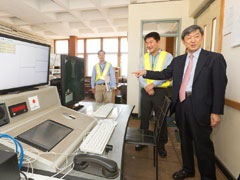
JICA President Shinichi Kitaoka tours the air traffic control system Japan supports at Kamuzu International Airport.
Finally, Mr. Kitaoka visited Kamuzu International Airport, an essential gateway to Malawi. JICA has been providing support for the airport since its opening in the 1980s, including improving its overall safety and convenience and training its air traffic controllers, through grant aid and technical cooperation. Mr. Kitaoka confirmed that it is playing an essential role in promoting foreign trade in land-linked Malawi.
The 7th Tokyo International Conference for African Development (TICAD7) will take place in Japan at the end of August 2019, and there are plans for discussion of initiatives for quality growth in Africa. Seizing the opportunity afforded by this visit by a JICA president, JICA will further contribute to the economic development of Zambia and Malawi and stronger relationships with them.




scroll